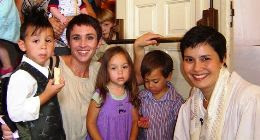What is Jewish community in America?
One of the confusing things about Jewish community is the feel of it – it’s different from mainstream American community. For folks who aren’t Jewish it can seem to make sense that Jews are different – even if they can’t quite put their finger on why. But for American Jews it can be baffling – why do I feel different or out of place? After all, I grew up here. At the heart of the matter is this: Jewish culture is communal – group oriented – in nature and American culture is individual.
Think of John Wayne, Indiana Jones, Daniel Boone, Lewis and Clark – all American heros who rode off into the wilderness – alone. The American dream is that an individual through hard work can rise to wealth and greater independence. If you become wealthy enough you can pay for your own home, car, health care, vacations, etc.
On the other hand, Judaism’s greatest hero is Moses. When Moses rode (or walked) off into the wilderness he took the whole Jewish family along, the women and children, the weak as well as the strong, the complainers with the enthusiasts. Moses complained to God about the incredible hassle the children of Israel were, but he also defended and protected them from everyone, including God. The Jewish dream is a time of peace for all the Jews, an end to persecution and the return to Zion. The expectation is that each Jew will care for all the other Jews, sublimating his or her own personal desires for the greater good.
Now sit with that for a moment. That means as an American Jew you are told to both work hard, get ahead, become wealthy enough to be self sufficient… and to take care of your community. In America that can be felt as a burden. We are all so busy being independent that people often fear communal responsibility will intrude on their happiness, on their autonomy.
But when I talk to individuals about what exactly is communal responsibility they often warm to the idea rapidly. Do you want there to be: people who bring meals when you are sick? Someone who picks up your kids from school because you’re working late. Someone to help pay for medicine for an elderly woman next door. Someone who clears the brush from around your house before fire season. Someone who raises money for the Food Bank. Someone to sit with you when your parent dies. Someone to visit you when you are sick, and do a bit of vacuuming while they are here.
In America we create Jewish community in synagogue. There the multiple burdens – responsibilities – are spread out over the many members so that no one person is expected to do it all.
Perhaps you will be rich enough to buy all that you and your family will ever need; I know I won’t be. And for those like me, there is community. Perhaps you have a close knit group of friends who will do this for you. I know that I don’t have enough friends for all my needs. Most of my friends work and can’t be available at all times.
But I’m not Jewish
Maybe you are thinking I’m not Jewish, I’m not sure how that would work for me. Here’s how – if you belong to a community you belong. A Catholic friend of mine told me she was being supported in the lost of her mother by her rabbi. Another told me she has a disease that she is fighting and her community has supported her emotionally in her health struggles. A man told me, “Guys aren’t so good at making friends, but I joined the mens group and we are bonding.” A non-Jewish man told me that the Caring committee had taken care of him and his daughters as his wife slowly died of cancer. A Jewish mom walked into Torah study at her congregation and said, “My husband isn’t Jewish, I don’t have a lot of relatives. I need for all of you to come to our daughter’s bat mitzvah so there will be plenty of voices carrying the songs and prayers.” When my nephew leaves for Iraq next month I am asking my synagogue’s women’s group to help me send him and his unit a monthly care package.
None of us can actually make it alone. Not physically. Not emotionally. Even if you are Hans Solo (note that last name!), eventually you need the rest of the Jedi Knights to back you up. Admitting our weaknesses can be our greatest strength. Don’t be afraid to be helped and to give help.
Summer is a great time to check out synagogues to see if there is one that fits you. I’m happy to help. Just call me.
What if you are still saying, I’m not ready or I just don’t want to join anything. That’s fine. You can still drop in and visit when you feel like. The welcome sign is out!


